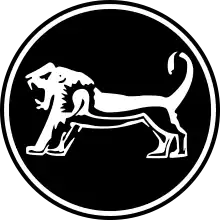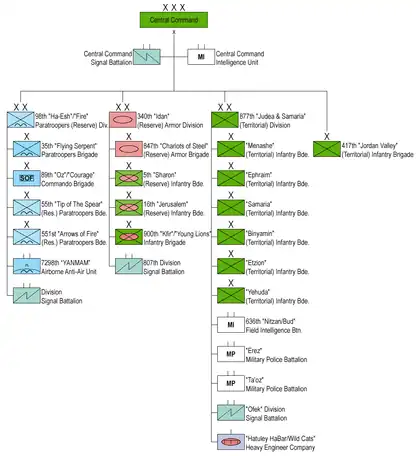Central Command (Israel)
The Central Command (Hebrew: פיקוד מרכז, Pikud Merkaz), often abbreviated to Pakmaz (פקמ"ז), is a regional command of the Israel Defense Forces. It is responsible for the units and brigades located in the West Bank (under the West Bank Division), Jerusalem, the Sharon, Gush Dan, and the Shephelah.
| Central Command | |
|---|---|
 Pakmaz logo | |
| Country | |
| Part of | |
| Commanders | |
| Current commander | Yehuda Fox |
The commander (Aluf) of the central command is the one who is authorized to declare new cities in the Judea and Samaria Area.[1]
History
During the 1948 Arab–Israeli War, the Central Command was in-charge of the war efforts against Jordan, particularly on the road to Jerusalem, occupying the "Small Triangle" (east Sharon), Lod, and Ramla. During the Six-Day War, the Command led the occupation of the West Bank from Jordan. As of the First Intifada, the Command primarily engages in security and counter-terrorism activities, as well as more conventional military measures, in the West Bank.
Towards the end of 2010 the deployment of IDF troops in and around the West Bank reached a new quantitative low with only half the number of infantry battalions serving where "dozens" were required during the first Intifada.[2]
Units

- Central Command in Neve Yaakov
- 98th "Ha-Esh"/"Fire" Paratroopers (Reserve) Division
- 99th "Flash" Infantry (Reserve) Division
- 877th "Judea and Samaria" (Territorial) Division
- 417th "Jordan Valley" (Territorial) Infantry Brigade
- 41st "Jordan Lions" Unisex Light Infantry Battalion
- 47th "Young Lions" Unisex Light Infantry Battalion
- 5004th "Central Command" Logistic Support Unit
- Central Command Signal Battalion
- Central Command Engineering Unit
- Central Command Intelligence Unit
- Central Command Military Police Unit
- Central Command Medical Unit
- 650th Maintenance Center
Commanders
All commanders of the Central Command were ranked Aluf (Major General).
- Zvi Ayalon (1948–1952)
- Yosef Avidar (1952–1953)
- Zvi Ayalon (1954–1956)
- Zvi Zur (1956–1958)
- Meir Amit (1958–1959)
- Yosef Geva (1960–1966)
- Uzi Narkis (1966–1968)
- Rehav'am Ze'evi (1968–1972)
- Yona Efrat (1973–1977)
- Moshe Levi (1977–1981)
- Ori Orr (1981–1983)
- Amnon Lipkin-Shahak (1983–1986)
- Ehud Barak (1986–1987)
- Amram Mitzna (1987–1989)
- Yitzhak Mordechai (1989–1991)
- Danny Yatom (1991–1993)
- Nehemiah Tamari (1993–1994) - KIA
- Danny Yatom (1994)
- Ilan Birn (1994–1995)
- Uzi Dayan (1996–1998)
- Moshe Ya'alon (1998–2000)
- Yitzhak Eitan (2000–2002)
- Moshe Kaplinsky (2002–2004)
- Yair Nave (2004–2007)
- Gadi Shamni (2007–2009)
- Avi Mizrahi (2009–2012)[3]
- Nitzan Alon (2012–2015)
- Roni Numa (2015–2018)
- Nadav Padan (2018–2020)
- Tamir Yadai (2020–2021)
- Yehuda Fox (2021–)[4]
References
- Golan, Boaz (7 March 2008). "Modi'in Illit Declared a City" (in Hebrew). NRG. Archived from the original on 19 June 2008. Retrieved 8 March 2008.
- Pfeffer, Anshel (28 November 2010). "West Bank Sees Lowest IDF Troop Levels Since First Intifada". Haaretz. Retrieved 8 October 2023.
- "IDF chief Ashkenazi announces new hires in General Staff - Haaretz - Israel News". Archived from the original on 10 August 2009.
- "Breaking silence, Netanyahu defends IDF general attacked by coalition MKs". The Times of Israel. 2 August 2023. Retrieved 8 October 2023.